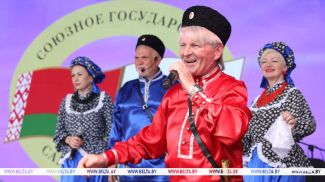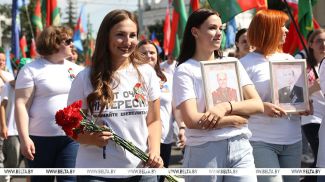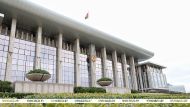The public opinion poll in Belarus was commissioned by the BelTA news agency and was conducted by the EcooM think tank with the involvement of the Ukrainian Policy Foundation and in cooperation with the sociological centers accredited in Belarus. The survey was carried out from 12 January to 8 February. Using paper questionnaires and tablets, pollsters interviewed 9,896 respondents in 108 localities across all regions of Belarus, sampling the Belarusian population older than 18 by gender, age, level of education, type of settlement and region. Statistical sampling error does not exceed 2.5%.
The two-stage field survey was preceded by a pilot telephone survey to prepare the necessary tools and build up the tactics for collecting primary sociological information. The first stage featured a territorial survey of the economically active population. The first stage was followed by the second stage with a wider coverage of different groups of people. Respondents were asked to fill in formal questionnaires. Pollsters also asked respondents about their needs and expectations, and collected proposals to improve the government policy in various fields. The emphasis was on open-ended questions to learn the personal point of view of respondents. The survey gives a clear objective picture of the public opinion of Belarusian citizens. Sergei Musiyenko, director of the EcooM center, commented on the results of the survey in an interview with BelTA.
According to the survey, the approval rating of the Belarusian president is 66.5%. Babariko has 2.5%, Tikhanovskaya - 1.5%, Latushko - 1.3%, Gaidukevich - 1.9%, Golovchenko - 3.8%, Rumas - 0.4%, Kochanova - 4.4%, Makei - 2.4%. 5.8% of respondents have no trust in any government official or politician.
“It was an open-ended question. People named the politician they trust. Of course, those 5.8% who do not trust any authorities and politicians merit attention. It is a group of people who do not trust anyone. We need to take their opinion into account and understand that such people exist. It is good that Roman Golovchenko enjoys a significant approval rating, although he has not worked as prime minister long. This means his work and the work of his press office is visible to people, which gains him such a good approval rating. Because not every person who takes up a high post immediately receives approval. Kochanova landed second in the ranking and this is not only because of her post. Her meetings with young people and students have attracted attention lately. She does not shy away from public outreach. Makei is the foreign minister and has to speak publicly often. For example, the interview he gave together with his wife was actively discussed by the public. His rating may be higher now,” Sergei Musiyenko said.
According to him, the drop in the rating of Tikhanovskaya and Latushko sticks out. “They called themselves politicians, but they failed to turn into politicians worthy of the name due to their action or inaction, or lack of skills. Or let's take Babariko. He disappeared from the political scene, but he still has a higher rating than those who constantly harm their homeland. People take notice of such things. A person who wishes harm on your country, you and domestic companies, cannot be trusted. That is, they do everything to please someone, but not their own people,” the EcooM director said.
72.4% of Belarusians do not support the protests that took place in our country in August 2020. They are supported by 6%. “When these things happened in Minsk, people from other cities called and asked: what is going on over there? That is, they lived their normal lives, while Minsk was largely paralyzed. People do not want this to happen again. What is it for? There is no purpose, there is no point. These answers suggest disapproval of what is happening. Therefore, these figures speak louder than words,” the expert stated.
57.8% of respondents are sure that the government's actions to suppress street protests are justified. “The society understands that the actions of the government to crack down on these protests were right. When you are driving your car to pick up your kid from school and some weirdo is blocking the road, what can you do? Drive into them and thus act the same way as they do? Our society is better than that. Therefore, of course, the government should interfere, otherwise it may end up bad,” Sergei Musiyenko said.
Belarusians believe that protests have a negative impact on their quality of life. This opinion was voiced by 75.9% of respondents. “People have not been able to take their children to out-of-school classes for months. There were also problems with car parking, children's safety. Many people, if they had the opportunity, would leave the city on weekends to escape from the protests. The figures show the public disapproval of the process. These figures are quite telling, in my opinion,” said the analyst.
Some 62.1% expressed a negative opinion of the public use of the white-red-white flag. According to the EcooM director, the reports in the media explaining the meaning of the white-red-white flag contributed to such a result. Some 17.6% said they did not care. “What strikes me most is the indifference on this issue. The worst things in life happen because of indifference,” said Sergei Musiyenko.
As many as 30.9% of Belarusians do not know whose interests the opposition leaders represent. Some 23.0% believe that they express the interests of the West, 17.2% - their own interests. “30.9% is a very telling figure. Whose interests are they defending? Certainly not ours. People suspect the involvement of Western countries, or personal interests. They see those squabbles about who is the leader, who is going to reap most of the benefits, and mutual accusations. People see self-serving interests of other countries. This is treason. After all, we are descendants of the war generation of partisans, not traitors,” Sergei Musiyenko stressed.
Some 38.2% of Belarusians do not trust the Belarusian opposition. “Another question arises here. Who is the Belarusian opposition? There is no leader and hence there is no opposition,” the expert said.
As many as 57.8% of respondents believe that the current Constitution meets the needs of society and the state. “Internally, there is a feeling in the society that, in principle, everything is fine. The proverb says, let well alone. Why and what is there to change? Only 9.2% are sure that the Constitution should be amended. If we expand this question and ask to specify) what needs to be done, there will be no answers. The dialogue platforms were set up for this very purpose. The authorities did their best to heed to people,” the director of EcooM said.
Some 71.2% of Belarusians approve of cooperation with Russia, 31.5% with the European Union, 27.4% with China, 23.6% with the Eurasian Economic Union (EAEU), and 10.3% with the United States.
“Why does Russia place first? This is obvious. Russia gives us vaccines and supports us in difficult times. So, it is no surprise that people think highly of it. At the same time, the popularity of the European Union has declined. The distance between us is growing amid admonitions and threats coming from its territory,” Sergei Musiyenko said.
Another question concerned the achievements of the sovereign Belarus that should be preserved. As many as 72.9% of the polled named order and stability, 57.3% – sovereignty and independence, 54.2% – the quality of healthcare and education services, 48.9% – the quality of food and industrial goods, 39.3% – the welfare state, 36.6% – people's living standards, 18.8% – the nuclear energy industry development, 12.7% – sports achievements.
“It is very important that people mention order and stability among our achievements. When Aleksandr Lukashenko said that our main goal is to avoid a war, external aggression, and unrest in the country, no one took his words seriously. Then suddenly everyone noticed that these threats were already at our doorstep. People understand that we should preserve order and stability as well as sovereignty and independence,” Sergei Musiyenko noted.
According to him, Belarusians take free healthcare and education services for granted, while in many countries people have to pay for these services. “Look how well our healthcare system responded to the pandemic. We should give the government credit for it. We have been taking preventive measures because of our mentality. The quality of food products has not deteriorated. When we go abroad, locals often warn us not to buy some products. I believe people should be more appreciative of the high quality of local food. This is our great achievement, even Western countries agree with it. Some types of Belarusian chocolate have become better than Swiss chocolate, even the Swiss admit that. As for the Belarusian nuclear power plant, people view it as a new milestone. The whole world is switching to electric transport, and Belarus has also jumped on the bandwagon,” the expert stressed.
Among the most-trusted foreign leaders are Chinese leader Xi Jinping (51.3%) and Russia President Vladimir Putin (49.7%). They are followed by Angela Merkel (26.4%) and Joseph Biden (18.4%). Confidence in Latvia President Egils Levits and Lithuania President Gitanas Nauseda is the lowest – 1.5% and 9.5% respectively. As for the mistrust rating, it is led by Poland President Andrzej Duda (47.7%) as well as Lithuania President Gitanas Nauseda (39.7%) and Ukraine President Vladimir Zelensky (38.7%). “Trust relies on long-standing cooperation. Confidence in a politician is confidence in a country. We know that Lukashenko is the leader of the approval rating in Ukraine and one of the leaders in the public opinion in Russia,” Sergei Musiyenko noted.
Respondents rated their trust and confidence in Belarusian politicians in the following way: Lukashenko – 49.6%, Kochanova – 4.83%, Golovchenko – 4.12%, Babariko – 3.4%, Andreichenko – 2.3%, Rumas – 2.26%, Makei – 2.18%, Tikhanovskaya – 1.94%, Gaidukevich -1.45%, Karpenko -1.08%, Latushko – 0.9%, Tsepkalo – 0.82%, Myasnikovich – 0.55%, Kolesnikova – 0.47%, Rogachuk – 0.42%, Tikhanovsky – 0.38%, Sidorsky – 0.35%, Semashko – 0.32%, Yermoshina – 0.2% Karanik – 0.18%, Zayats – 0.15%, Statkevich – 0.15%, Karayev – 0.13%, Dmitriyev – 0.11%, Kobyakov – 0.1%, Severinets – 0.07%, Lebedko, Poznyak and Cherechen – 0.05%.
“Severinets and Lebedko's approval ratings are very telling. They have been in the game for 30 years and have 0.05% each. Such figures are usually not even applicable. I mention them to show that this is their true rating. The survey polled 10,000 people, and this is what they get. The rating of those who view themselves as opposition leaders fell significantly. People mentioned only Rogachuk among mayors. Why are governors not featured in the rating? Governors have an impact on the perception of authorities in general. This shows that local authorities, regions need to step up and reach out to people more. This reflects on the rating of the state,” Sergei Musiyenko concluded.
BelTA













